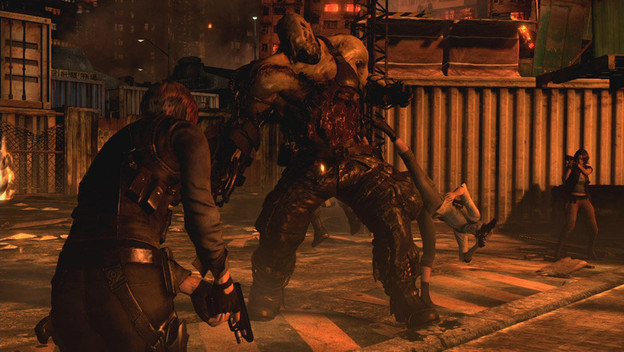OK everyone, let’s talk about reviews and review scores.
The other day I was watching Caddicarus’s most recent YouTube video. I’ve always found his videos entertaining and he was doing an episode on Resident Evil Zero for Halloween, and for the most part I enjoyed it.
But, there was one joke in his video that kind of got to me. It was “The critics loved this game, but the critics also loved Resident Evil 6 *snark snark.*” As if it was accepted that Resident Evil 6 was a horrible game and anyone who reviewed it positively was some gigantic asshole that didn’t understand that the game sucked. Liking Resident Evil 6 was being used as an insult, a sign that someone has not taste or doesn’t know what they are talking about. Yes, this is a comedy show and I know the line was played for laughs, but there are a lot of people that feel this way, as if all reviewers need to cleave to some unknown and hidden “objective opinion” that the gamer deities have handed down on high, and those that don’t are either dumb or corrupt.
Well, I’ll let you in on a little secret. I liked Resident Evil 6 . I genuinely enjoyed that game. I played it from start to finish. I liked the three different characters and three different play styles. I liked the nods to Resident Evil ’s past. I thought there were flaws in the game, sure. It wasn’t scary and couldn’t in the least bit be considered a horror game. A lot of sections were repetitive and a lot of the puzzles were frustrating. But I still genuinely enjoyed the game.
Now I didn’t review the game, but if I did, I would have given it a good score. Why? Because that was my opinion. Despite its flaws, I enjoyed it.
But many people would find something wrong with that. They would say that Resident Evil 6 is somehow “objectivley bad” and that writing a review with a positive opinion would garner me a reputation as untrustworthy. I cannot tell you how many times I hear “the reviewers don’t know what they are talking about” from my gamer friends.
Do they really? Is it really the case that they don’t know what they are talking about? ‘Cause it seems like they are talking about their own opinion of a game and I would guess they would be the authority on that issue.
Or maybe their opinion just doesn’t line up with yours… and if you just wanted to hear your own opinions reiterated to you, why are you reading reviews in the first place? Why not just go talk in front of a mirror!

I, capital H, HATE the term “game journalism” because I think it obfuscated what reviewers are actually doing. If you review a movie, you aren’t a “movie journalist” you are a “movie critic.” It is your job to give your (key word) opinion on what a movie was like. Did you like the actors performances? Did you like the cinematography? It’s a widely accepted fact that some movie critics just don’t like the same movies that the movie going populace does, and their reviews aren’t looked at as wrong.
But in gaming, fans expect people to agree 100% of the time. You need to know whether a game is objectively good or bad to be a good reviewer, apparently. But that’s the catch! There is no objective “good or bad.” There is just our many and varied opinions. I’m sure SOMEONE out there liked E.T. for the Atari 2600.
I think it’s a mistake to believe that there is some sort of objective truth out there to whether or not a game is good or bad. There are relative truths, of course. We can objectively say that Call of Duty: Advanced Warfare uses more advanced technology than Super Mario Bros. 3 . But when we ask “which game’s graphics are better” we are asking which game’s graphics produced more enjoyment, and that starts becoming subjective. I would say that Super Mario Bros. 3 ’s graphics are better because, comparatively, the graphical jump from SMB1 to SMB3 is bigger than the jump from COD: Ghosts to COD: Advanced Warfare .
And right now there are a bunch of you out there going “bullsh*t! That’s now how graphics work!” and that’s fine! That’s your opinion. That’s how you judge graphics. I judge them differently and every other reviewer in the world judges them differently. That’s OK. It’s OK to have different opinions and it’s OK for your opinion to not fall in line with the opinion of the majority.
So maybe let’s stop shaming people for having opinions. Maybe we should start looking at reviews as opinion rather than some bizarre objective appraisal of a game’s worth. After all, why would you WANT everyone’s opinion to be the same? Don’t you get the most information from a variety of different and even conflicting viewpoints expressed via multiple different publications? Why would we even have more than one reviewer if all you want to hear is the same opinion over and over again?
Or maybe we are all just slowly heading toward a future where that is the case. All hail our new robot overlord, Review-o-tron 5000.
What do you guys thnk? Do game reviews all need to have the same opinion? Or are wildly differing opinions in game journalism a good thing? Let us know in the comments.
